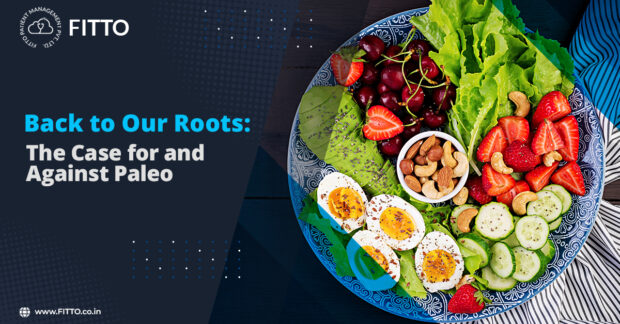Back to Our Roots: The Case For and Against Paleo
Centuries ago, our hunter-gatherer ancestors battled the elements every day for survival. Food was a scarcity found straight from nature, and their next meal was never guaranteed. But over the past 100 years, modern science and technology have allowed us to mass produce and preserve food on an unimaginably large scale. Humans no longer have to fight for survival. However, many studies argue that our bodies were never built to withstand the onslaught of fast food, processed food, or a sedentary lifestyle. Perhaps we were meant to go back to our roots and consume only what nature has to offer…
Introducing paleo, a diet trend that rose to prominence after research said that human beings of the paleolithic era were much healthier diet-wise than their weak, frozen-food reheating younger cousins of the modern world. The paleo diet entails consuming whole foods like organic fruits, vegetables, herbs, spices, nuts, healthy fats, and free-range, grass-fed meats while also maintaining an active lifestyle to reduce the risk of diseases like obesity, cancer, diabetes, and heart disease. This means that processed foods, sugar, most dairy products, grains, soft drinks, legumes, vegetable oil, margarine, and artificial sweeteners are all entirely off the table.
While such a diet can offer up some unique health benefits, it also involves removing significant food groups from your system, so we at FITTO think it's worth discussing both the pros and cons of this massively popular diet:
Why You Should Try Paleo:
1. Maintain Balanced Weight: There are very limited food options allowed by the paleo diet. However, this restriction can help overcome the need to eat unnecessarily. Paleo’s focus on fruits, vegetables, and nuts can boost feelings of satiation. Plus, the elimination of processed junk foods is sure to reduce one’s body weight. Paired with exercise, the paleo diet can certainly improve BMI.
2. Better Heart Health: Studies show that paleo can decrease other forms of cholesterol, thereby increasing HDL (High Density Lipoprotein) or “good cholesterol” levels in the body. This is linked to lower heart disease.
3. Lowers Blood Glucose Levels: Paleo insists on the consumption of foods that are naturally low in sugar, particularly carbohydrate-heavy foods. Researchers found that regardless of exercise, paleo managed to reduce the blood sugar levels of all participants after 12 weeks.
4. Eating Clean: The lack of processed foods in paleo means you will not be consuming any preservatives, artificial sweeteners/flavouring, or chemicals. This is a great detox for those of us who have become accustomed to highly processed foods. Not to mention, there are several anti-inflammatory benefits that come from consuming mostly fruits and vegetables.
5. Encourages Environmental Sustainability: The paleo diet can significantly increase one’s awareness not just towards the food one eats, but also where that food comes from. Consuming free-range grass fed meats, as well as food grown on sustainable farms greatly reduces your carbon footprint.
The Problem with Paleo:
1. Not a Sustainable Diet: Due to its restrictive nature, many nutritionists and former paleo practitioners have argued that the diet is very difficult to continue for long periods of time. Hence, one may not be able to enjoy its positive effects for that long either.
2. Cuts out Grains and Dairy: Carbohydrates are essential for energy creation in the body, and dairy products are a crucial source of calcium and vitamin D. Without either of these important nutrients, the paleo diet can put you at risk for low energy levels. Most athletes require approximately 3-6g of carbs a day; this is very hard to accomplish with fruits and vegetables alone.
3. Meat-Heavy Diet: Paleo can disrupt a person’s carb-to-meat ratio. From a long-term perspective, eating mostly meats can cause serious complications down the line. It also implies that the diet is difficult for vegetarians to sustain, since paleo does not allow the consumption of beans.
4. Ingredients Can Be Expensive and Elusive: Organic fruits and vegetables are obviously much pricier than regular produce, but sustainable meats are also incredibly hard to find in India.
5. Modern Humans are Just Different: It is impossible to empirically state that paleolithic humans were healthier than us. Our bodies are genetically different to theirs, and we have since evolved to adapt to our changing environment. Hence, it cannot be definitively stated that the paleolithic blueprint for diet cannot be applied to all humans today. We may simply be different.
The paleo diet is one of the most popular controversial fad diets which has risen to prominence in recent years. It seems to have significant benefits in terms of weight loss, healthy eating, and sustainability, but can also be restrictive, exclusionary, and hard to stick to. Hence, the polarization of the paleo debate; people swear by it and curse it in equal measure. Regardless, whatever you choose to follow, be sure to consult a licensed nutritionist before making any serious diet changes. Everyone’s bodies are different, so stick to a healthy diet and exercise routine that works for you.
References:
1. https://nunm.edu/2019/04/paleo-diet/
2. https://www.healthline.com/nutrition/paleo-diet-meal-plan-and-menu
About the Author








